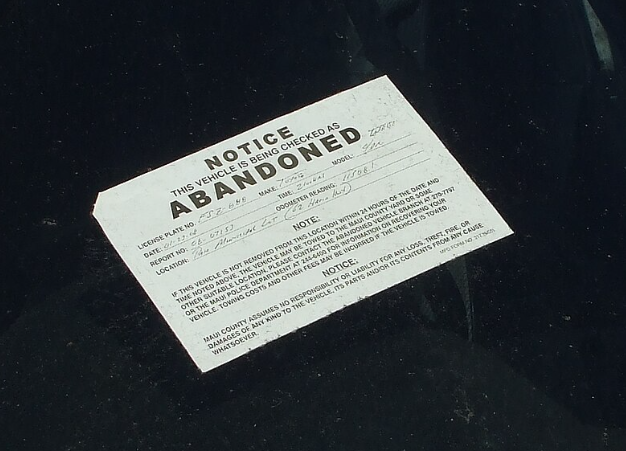Picture this: a guest comes to stay at your house. They leave, but their belongings don’t. Days turn into weeks, and their possessions still occupy your living space. This scenario can create a conundrum, leaving you questioning, “How long can someone leave their belongings on your property?”
In this article, we’ll unlock the legal and practical implications of this question, focusing on abandoned property laws, property owner rights, and the timeframe for removing abandoned belongings. Let’s navigate these somewhat murky waters together, and make sure your property remains, well, yours.
Abandoned Property Laws: Understanding the Legalities

It’s essential to comprehend the legal definition of ‘abandoned property’ before taking any action. Typically, property is considered abandoned when the owner intentionally gives up their rights to the property without transferring their interest to anyone else.
Unclaimed property time limits vary depending on your jurisdiction. Generally, you are required to store the items safely for a period of between 30 and 60 days, but it can be as short as a few days in some areas. Therefore, always check your local laws before acting.
What are the Rights of Property Owners?
As a property owner, you are obligated to handle someone else’s abandoned items with care. That means you cannot dispose of or sell these items immediately after they’ve been left. You have the responsibility to attempt to contact the owner and give them a reasonable opportunity to retrieve their belongings.
Remember that as a property owner, you also have rights. For instance, if storing someone else’s belongings incurs costs, you may be entitled to seek compensation. Again, this largely depends on local laws, so consult with a legal expert to understand your specific rights and obligations.
The Clock Is Ticking: Timeframe for Removing Abandoned Belongings
While there’s no universally applicable time limit for claiming abandoned belongings, there are typical practices you can follow. After the belongings have been on your property for a reasonable period, and you’ve made good faith efforts to contact the owner without success, you may consider these items abandoned. At that point, you can take steps to dispose of them or, in some cases, claim ownership.
However, please be aware that these steps are not to be taken lightly. It’s always best to engage with a legal professional before moving forward, as incorrectly handling someone else’s property could lead to legal complications.
Property Owner Responsibilities: Handling Abandoned Items
Dealing with abandoned property can be an administrative burden. Nonetheless, taking a systematic, methodical approach can make the process more manageable. When you find someone else’s belongings on your property, you should:
- Document the items: Take photos and make a list of the items left behind.
- Try to contact the owner: Send a written notice explaining the situation, and ask them to remove their belongings.
- Wait for the response: Allow a reasonable period (typically 30-60 days) for the owner to retrieve their belongings.
- Consult legal advice: If the owner doesn’t respond, consult with a legal professional about your next steps.
- Dispose of or claim the items: Depending on your local laws and the advice of your lawyer, you may then have the option to dispose of or claim the items.
The More Unseen Side: Property Abandonment Process and its Consequences
Once we’ve identified that property is indeed abandoned, it becomes vital to comprehend the process for declaring it so, as well as the potential consequences for both the original owner and the property holder. Delving deeper into the property abandonment process, unattended property regulations, and property abandonment consequences, we can help you further navigate this legally intricate subject.
The Property Abandonment Process: Guidelines for Your Peace of Mind
The steps you need to take to officially declare property as abandoned will depend on your local laws, but generally, they might include the following:
- Identify the Owner: The first step is to identify who owns the abandoned property. This might be straightforward if the items belong to a friend or relative who stayed at your property. But in some cases, identification might require some research.
- Notify the Owner: Once the owner is identified, you should notify them about their abandoned property. This notification should be in writing and sent via certified mail for record-keeping purposes. This correspondence should detail what items have been left, how long they have been there, and a request to collect them within a specific period.
- Wait: Once the notice has been sent, you should wait the timeframe outlined in your letter. This wait is essential and provides the owner with a reasonable opportunity to retrieve their belongings. This time period can vary by jurisdiction, so consult your local laws or a legal professional to determine an appropriate timeframe.
- Follow-up: If the owner does not respond or collect their belongings within the specified time, you may need to send a follow-up notice. This notice should explain the potential consequences if they do not retrieve their belongings.
- Action: If all attempts to reach the owner have failed, then you may be within your rights to consider the property abandoned. From there, depending on local laws, you may dispose of the items, sell them, or claim them as your own. Always consult with a legal professional before taking these steps.
Unattended Property Regulations: The Golden Rule
As a property owner, it’s essential to treat other’s belongings as you’d want yours to be treated in a similar situation. These guidelines stem from the legal principle of “duty of care,” which states that a person must act toward others and the public with the watchfulness, attention, caution, and prudence that a reasonable person in the circumstances would use.
While specific regulations regarding unattended property may vary, a good rule of thumb is to always act in good faith, documenting your actions, and communicating clearly and promptly.
Property Abandonment Consequences: What’s at Stake?
The consequences of property abandonment can be significant for both parties involved.
For the original owner, their belongings could be discarded, sold, or become the property of another person. This loss can have financial and, sometimes, sentimental consequences.
For the individual dealing with the abandoned property, mishandling the situation could lead to legal ramifications, including potential lawsuits for damage or unlawful disposal of the belongings. Therefore, it’s crucial to handle such situations carefully, respectfully, and in adherence with local laws.
FAQs on How Long Can Someone Leave Their Belongings on Your Property?
Can I dispose of someone’s abandoned items on my property?
Yes, but only after following the appropriate steps, including attempting to contact the owner and allowing a reasonable period for them to retrieve their items.
Can I charge someone for leaving their belongings on my property?
This depends on local laws, but you may be able to seek compensation if you incur costs from storing the items.
Are there any regulations for unattended property on private premises?
Yes, laws for unattended property vary, so it’s crucial to consult a legal expert or research your local laws.
What is the process for dealing with abandoned personal items on my property?
The process involves identifying and notifying the owner, waiting for a response, and then potentially disposing of, selling, or claiming the items if the owner does not retrieve them. This process can vary, so always consult with a legal professional.
Can I sell abandoned items left on my property?
In some jurisdictions, you may be able to sell abandoned items left on your property. However, this usually requires that you’ve followed proper procedures and have waited a specified amount of time. Always consult your local laws or a legal professional before proceeding.
Also Read: Is the jury in the Murdaugh trial sequestered?
Concluding Thoughts
Understanding how long can someone leave their belongings on your property might feel overwhelming. However, by keeping your actions within legal boundaries, and always treating others’ possessions with care and respect, you can navigate these situations confidently and ethically. Remember that, while the situation may seem daunting, resources are available to assist you, including legal professionals who specialize in property laws and regulations.




